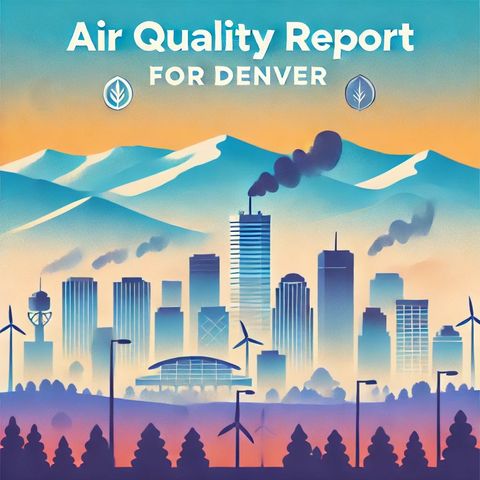Denver Grapples with Air Quality Challenges Amid Geographical, Transportation, and Wildfire Impacts

Scarica e ascolta ovunque
Scarica i tuoi episodi preferiti e goditi l'ascolto, ovunque tu sia! Iscriviti o accedi ora per ascoltare offline.
Denver Grapples with Air Quality Challenges Amid Geographical, Transportation, and Wildfire Impacts
Questa è una trascrizione generata automaticamente. Si prega di notare che non è garantita la completa accuratezza.
Descrizione
I’m unable to browse the internet for real-time data or provide current air quality reports. However, I can offer a general overview of Denver's air quality issues, which you may...
mostra di piùDenver, the capital of Colorado, is known for its picturesque landscapes and proximity to the Rocky Mountains. However, the city often grapples with air quality challenges. Several factors contribute to this issue.
Firstly, Denver's unique geographical setting influences its air quality. Situated in a basin surrounded by mountains, the city often experiences temperature inversions. These inversions trap pollutants close to the ground, leading to increased pollution levels, especially during winter months. Inversions can cause concentrations of particulate matter and other pollutants to rise significantly, impacting both health and visibility.
Secondly, road transportation in and around Denver is a significant contributor to air pollution. While the city has made strides in promoting public transportation and sustainable travel options, the growing number of vehicles still plays a role in releasing nitrogen dioxide and other emissions into the air.
Industry and energy production also impact air quality in the region. While regulations have helped reduce emissions from these sources over the years, some industrial processes and power plants still contribute to pollution levels. Denver is also influenced by pollution from oil and gas extraction in nearby areas, further contributing to its air quality challenges.
Wildfires are another factor affecting Denver's air. Smoke from fires in Colorado and neighboring states can drift into the city, raising levels of fine particulate matter and other pollutants. This is particularly concerning during dry seasons and periods of drought.
To address these issues, Denver has been proactive in implementing measures to improve air quality. The city has introduced programs aimed at reducing vehicle emissions, encouraging the use of public transportation, and promoting cleaner energy sources. These efforts are part of a broader strategy to ensure healthier air for Denver's residents.
Community involvement and education also play a crucial role in air quality improvement. Local organizations advocate for policy changes and engage citizens through initiatives that promote environmental sustainability.
While challenges remain, Denver has taken significant steps towards improving its air quality. Continuous monitoring and community efforts are essential in tackling this ongoing issue. Residents and visitors are encouraged to stay informed about daily air quality levels through local resources and public health advisories.
For the most accurate and current air quality data for Denver, it's recommended to check resources like the Environmental Protection Agency's Air Quality Index website or local agencies that provide real-time air quality updates.
Informazioni
| Autore | QP-5 |
| Organizzazione | William Corbin |
| Sito | - |
| Tag |
Copyright 2024 - Spreaker Inc. an iHeartMedia Company

Commenti